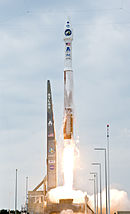Atlas (rakieta nośna)
Atlas – seria amerykańskich rakiet kosmicznych o średnicy 3,05 m (10 stóp lub 3,81 m (12,5 stóp) tylko Atlas V) konstruowanych przez firmę Lockheed Martin. Początkowo zaprojektowane jako międzykontynentalne pociski balistyczne, rodzina rakiet Atlas służy do dziś jako rakieta nośna dla ładunków cywilnych i wojskowych. Rakiety z tej serii służyły także do wynoszenia załogowych statków kosmicznych typu Mercury, oraz sond programów Pioneer, Mariner, Ranger, Surveyor i Lunar Orbiter, a także nowoczesnych sond takich jak MRO, LRO/LCROSS, Juno, New Horizons i Curiosity.
Współcześnie latające rakiety Atlas
- Atlas V (2002–dziś)
Historyczne warianty rakiety Atlas
- Atlas B
- Atlas C Able
- Atlas D Able
- Atlas D
- Atlas Agena
- Atlas Centaur
- Atlas I (1990–1997)
- Atlas II (1991–2004)
- Atlas III (2000–2005)
Linki zewnętrzne
- Mark Wade: Atlas (ang.). W: Encyclopedia Astronautica [on-line].
- Historia pocisków międzykontynentalnych Atlas (ang.)
- Gunter Krebs: Atlas Family (ang.). W: Gunter's Space Page [on-line].
| ||||||||||||||||||||||||||||||||||||||||||||||||||||
Media użyte na tej stronie
Trailing a column of fire, the Atlas V(401) carrying NASA's Lunar Reconnaissance Orbiter, or LRO, and NASA's Lunar Crater Observation and Sensing Satellite, known as LCROSS, hurtles off Launch Complex 41 at Cape Canaveral Air Force Station in Florida. LRO and LCROSS are the first missions in NASA's plan to return humans to the moon and begin establishing a lunar outpost by 2020. The LRO also includes seven instruments that will help NASA characterize the moon's surface: DIVINER, LAMP, LEND, LOLA , CRATER, Mini-RF and LROC. Launch was on-time at 21:32 UTC.
Atlas 3F prior to failed launch attempt





